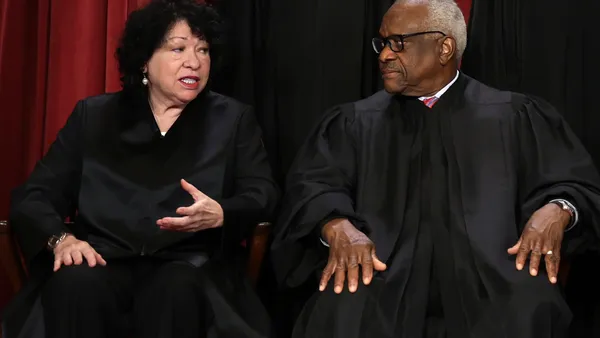Dive Brief:
- Former call center employees for a West Palm Beach, Florida, auto dealership did not qualify as “automobile salespersons” exempt from overtime under the Fair Labor Standards Act because they weren’t “primarily engaged in” selling automobiles, the 11th U.S. Circuit Court of Appeals held May 24 (Spikes v. Schumacher Auto Group Inc.).
- The employees, referred to as “sales associates,” worked in a separate business development center next door to the showroom, according to court documents. Their job was to convince potential customers over the phone to make appointments to view the cars, court records said. They received a salary and additional pay for each appointment they booked and for each appointment that led to a sale.
- The sales associates resigned and sued for unpaid overtime. The 11th Circuit ruled they didn’t meet the qualifications of an “automobile salesperson” because if they sold anything, it was appointments, not vehicles, and “an appointment ... is not itself an essential component of the commercial exchange of a vehicle.” The lower court must now determine if they could be exempt as commission-based employees of a retail or service establishment.
Dive Insight:
Next month, the ante goes up for employers to ensure they’ve properly classified employees as exempt from the FLSA’s minimum wage and overtime requirements.
This is because under a new U.S. Department of Labor rule scheduled to take effect July 1, the minimum annual salary an employee in a “bona fide executive, administrative or professional” capacity (also known as the “EAP” or “white collar” exemption) must be paid to be exempt from overtime under the FLSA increases from $35,568 to $43,888.
The DOL expects the rule will allow millions of U.S. workers to become eligible for overtime pay, the agency said in a press release.
On Jan. 1, 2025, the threshold is scheduled to increase to $58,656. This means an employee must make at least $844 per week as of July 1, and $1,128 per week as of Jan. 1, to be eligible for the exemption.
Additionally, the minimum threshold for workers to be considered exempt as “highly compensated employees” will also increase. Starting July 2027, the threshold is scheduled to be automatically updated every three years.
Employers may want to keep in mind that the rule affects only one aspect of a three-part test employees must satisfy to be properly classified as exempt EAPs. Employees must still meet the other two parts — a job duties test and payment on a salary basis, DOL administrators said in a webinar. Employers can also still use nondiscretionary bonuses and incentive payments, including commissions, to satisfy up to 10% of the standard salary level, they said.
Business groups, and more recently Texas Attorney General Ken Paxton, have sued to stop the rule from being enforced. They allege the rule is unlawful because, among other things, it “essentially make[s] an employee’s duties, functions or tasks irrelevant if the employee’s salary falls below the new minimum salary level,” per Paxton’s complaint.
HR professionals shouldn’t bank on the success of these and other possible challenges, experts say. Instead, there are steps they can take to prepare for the change, such as identifying which employees will be affected and determining what it would take to keep an employee’s pay above the new threshold, attorneys recently told HR Dive.
The Schumacher case involved different exemptions — employees classified as automobile salespeople and certain retail and service employees.
Schumacher argued that the sales associates qualified as automobile salespeople because they were an integral part of the sales team that led to a sale. But not “every person important to making sales happen” qualifies for the exemption, the 11th Circuit pointed out. What matters is an employee’s participation in the exchange of a commodity for money, and the appointments are not essential to this exchange, it explained.
On the other hand, the sales associates might qualify for the second exemption — “‘employees ... of a ‘retail or service establishment’ whose regular pay exceeds one-and-one-half times the minimum wage and whose monthly income is more than half commission-based,” the 11th Circuit found.
Even though the business development center and the dealership showroom were in separate buildings, there was a factual question about whether they were separate business units, which would disqualify the sales associates from the exemption, the court explained.
Viewed in the light most favorable to Schumacher, a factfinder could conclude they operated as one unit, the 11th Circuit noted: The sales associates were on the same payroll system, in a unified accounting department, as the other employees; they met with showroom salespeople to discuss upcoming appointments; and they were controlled and directed by the owners.












